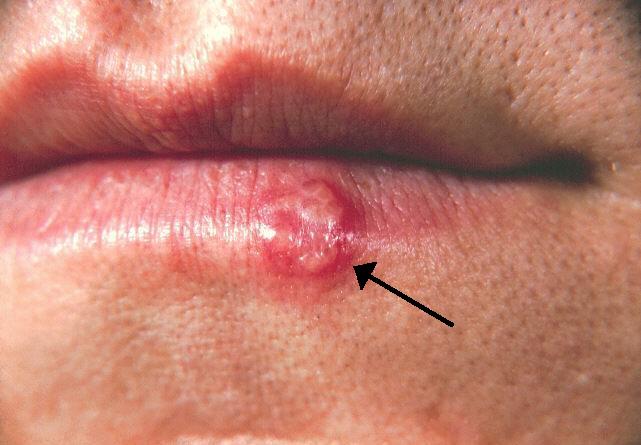
Image: "Herpes" by the Centers for Disease Control and Prevention (CDC) is in the public domain. Link to the source.
Herpes Labialis (Cold Sores)
Introduction | Aetiology and Risk Factors | Clinical Presentation | Diagnosis | Management and Treatment | Prevention | When to Refer | References
Introduction
Herpes labialis, commonly known as cold sores, is a recurrent viral infection caused by the herpes simplex virus (HSV), primarily HSV-1. It is characterised by painful vesicular lesions on the lips and perioral region. Cold sores are highly contagious and are typically self-limiting, but they can cause significant discomfort and social embarrassment.
Aetiology and Risk Factors
Herpes labialis is caused by the herpes simplex virus type 1 (HSV-1), though HSV-2 (commonly associated with genital herpes) can also cause cold sores, albeit less frequently:
- Initial Infection: Primary infection usually occurs in childhood and may be asymptomatic or present as gingivostomatitis. The virus then remains dormant in the trigeminal ganglion and can reactivate later in life.
- Reactivation Triggers: Several factors can trigger reactivation of the virus, leading to cold sores, including:
- Stress (physical or emotional)
- Sunlight or UV exposure
- Fever or illness (e.g., common cold, influenza)
- Menstruation
- Immunosuppression
- Trauma to the affected area
- Transmission: The virus is spread through direct contact with an active lesion or through saliva, making it highly contagious during outbreaks.
Clinical Presentation
Herpes labialis typically progresses through several stages:
- Prodromal Symptoms:
- Tingling, itching, or burning sensation around the lips or nose, usually 24-48 hours before the appearance of lesions.
- Vesicular Stage:
- Small, fluid-filled vesicles appear on a red, inflamed base, typically on the lip margin or perioral skin. These vesicles are often painful and can coalesce to form larger blisters.
- Ulcerative Stage:
- The vesicles rupture, leaving shallow ulcers that gradually crust over. The ulcers are highly infectious during this stage.
- Healing Stage:
- The crusts eventually fall off, and the skin heals without scarring in most cases. The entire cycle usually lasts about 7-10 days.
Diagnosis
The diagnosis of herpes labialis is primarily clinical, based on the characteristic appearance and history of recurrent lesions:
- History: A history of recurrent lesions in the same area, often triggered by stress, sun exposure, or other factors, supports the diagnosis.
- Physical Examination: The typical progression from tingling to vesicles and then crusting is highly indicative of herpes labialis.
- Laboratory Tests: Usually not necessary for a typical presentation, but in atypical cases or for confirmation, the following can be used:
- Viral Culture or PCR: Swabs from the vesicles can be tested for HSV DNA.
- Tzanck Smear: A less commonly used test that can show multinucleated giant cells typical of herpes infections.
Management and Treatment
Management of herpes labialis focuses on reducing symptoms, accelerating healing, and preventing recurrence:
1. Self-Care
- Avoid Triggers: Advise patients to avoid known triggers such as excessive sun exposure or stress. Use of lip balm with sunscreen can help prevent UV-induced reactivation.
- Hygiene Measures: Encourage patients to avoid touching the lesions, wash hands frequently, and avoid sharing personal items such as towels or lip balm to prevent spreading the virus.
2. Topical Treatments
- Topical Antivirals:
- Acyclovir Cream: Apply five times daily for 5 days. This can reduce the duration of symptoms if started early.
- Penciclovir Cream: Apply every 2 hours while awake for 4 days. Effective if started during prodromal symptoms.
- Topical Anaesthetics:
- Lidocaine Gel: Can be applied to relieve pain and discomfort, particularly during the vesicular stage.
3. Oral Treatments
- Oral Antivirals: For more severe or frequent outbreaks, oral antivirals can be prescribed:
- Acyclovir: 200 mg five times daily for 5 days.
- Valaciclovir: 2 g twice daily for 1 day.
- Famciclovir: 1500 mg as a single dose.
- Prophylactic Therapy: In cases of frequent recurrences (e.g., more than six episodes per year), long-term suppressive therapy with oral antivirals may be considered.
Prevention
Preventing herpes labialis focuses on reducing the frequency of recurrences and limiting the spread of the virus:
- Avoid Known Triggers: As mentioned, sun protection, stress management, and avoiding trauma to the lips can help prevent outbreaks.
- Lifestyle Modifications: Maintaining a healthy lifestyle, including adequate sleep, nutrition, and stress reduction, may help reduce the frequency of outbreaks.
- Prophylactic Antivirals: For patients with frequent or severe outbreaks, daily antiviral therapy can be effective in reducing recurrences.
When to Refer
Referral to a specialist is generally not required for typical cases of herpes labialis, but may be necessary in the following situations:
- Severe or Atypical Presentation: If the lesions are unusually severe, extensive, or do not follow the typical clinical course, referral to a dermatologist may be warranted.
- Immunocompromised Patients: Patients with weakened immune systems (e.g., those with HIV, cancer, or on immunosuppressive therapy) may require specialist care, as they are at higher risk of severe or disseminated herpes infections.
- Complications: Referral may be necessary if complications such as secondary bacterial infection or significant ocular involvement occur.
References
- British Association of Dermatologists (2024) Guidelines for the Management of Herpes Labialis. Available at: https://www.bad.org.uk (Accessed: 26 August 2024).
- National Institute for Health and Care Excellence (2024) Herpes Simplex Virus: Diagnosis and Management. Available at: https://www.nice.org.uk/guidance/ng98 (Accessed: 26 August 2024).
- British National Formulary (2024) Antiviral Medications and Their Use in Herpes Simplex Virus Infections. Available at: https://bnf.nice.org.uk/ (Accessed: 26 August 2024).
Check out our YouTube channel
Blueprint Page
Explore the comprehensive blueprint for Physician Associates, covering all essential topics and resources.
Book Your Session
Enhance your skills with personalised tutoring sessions tailored for Physician Associates.

